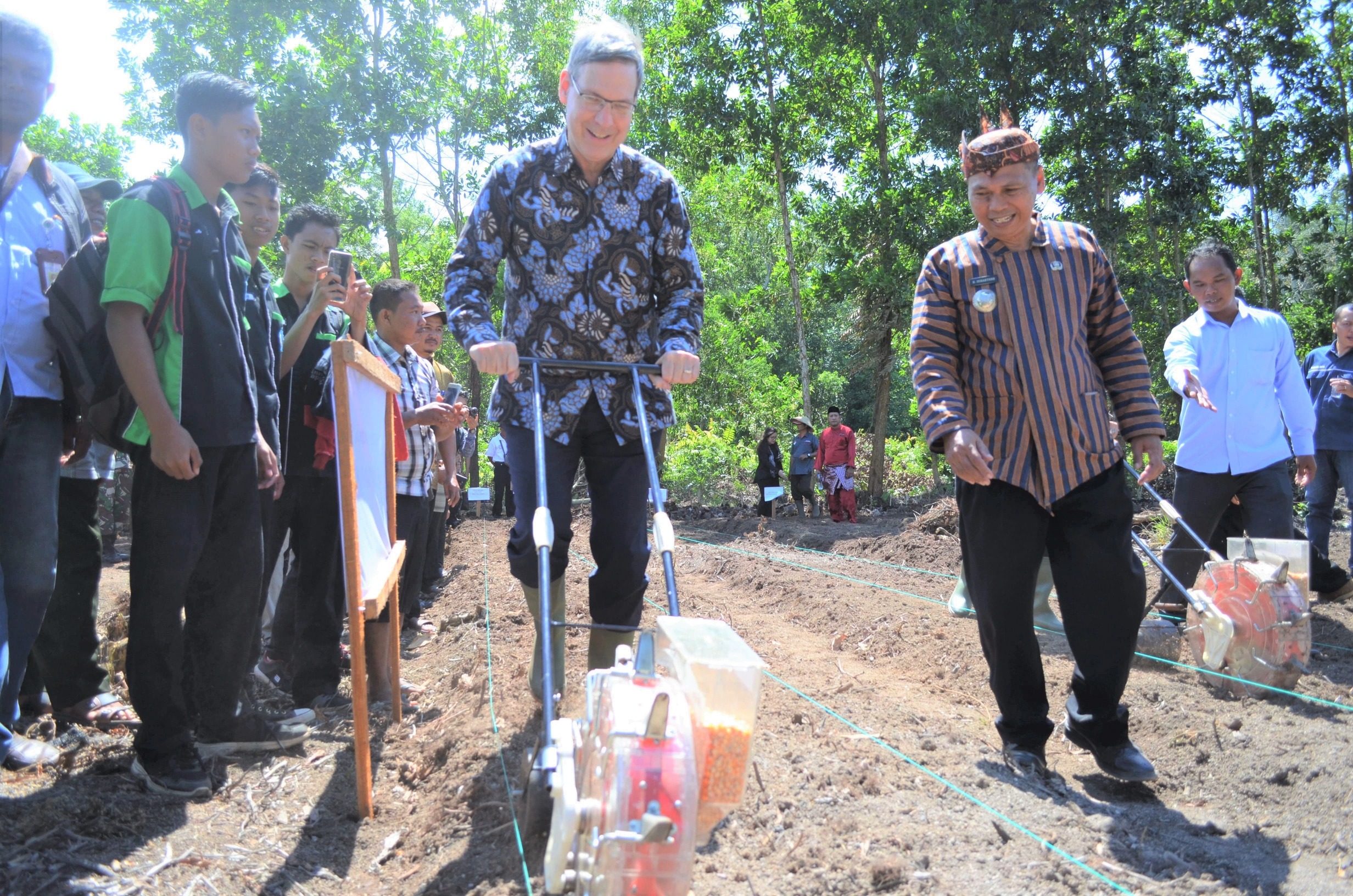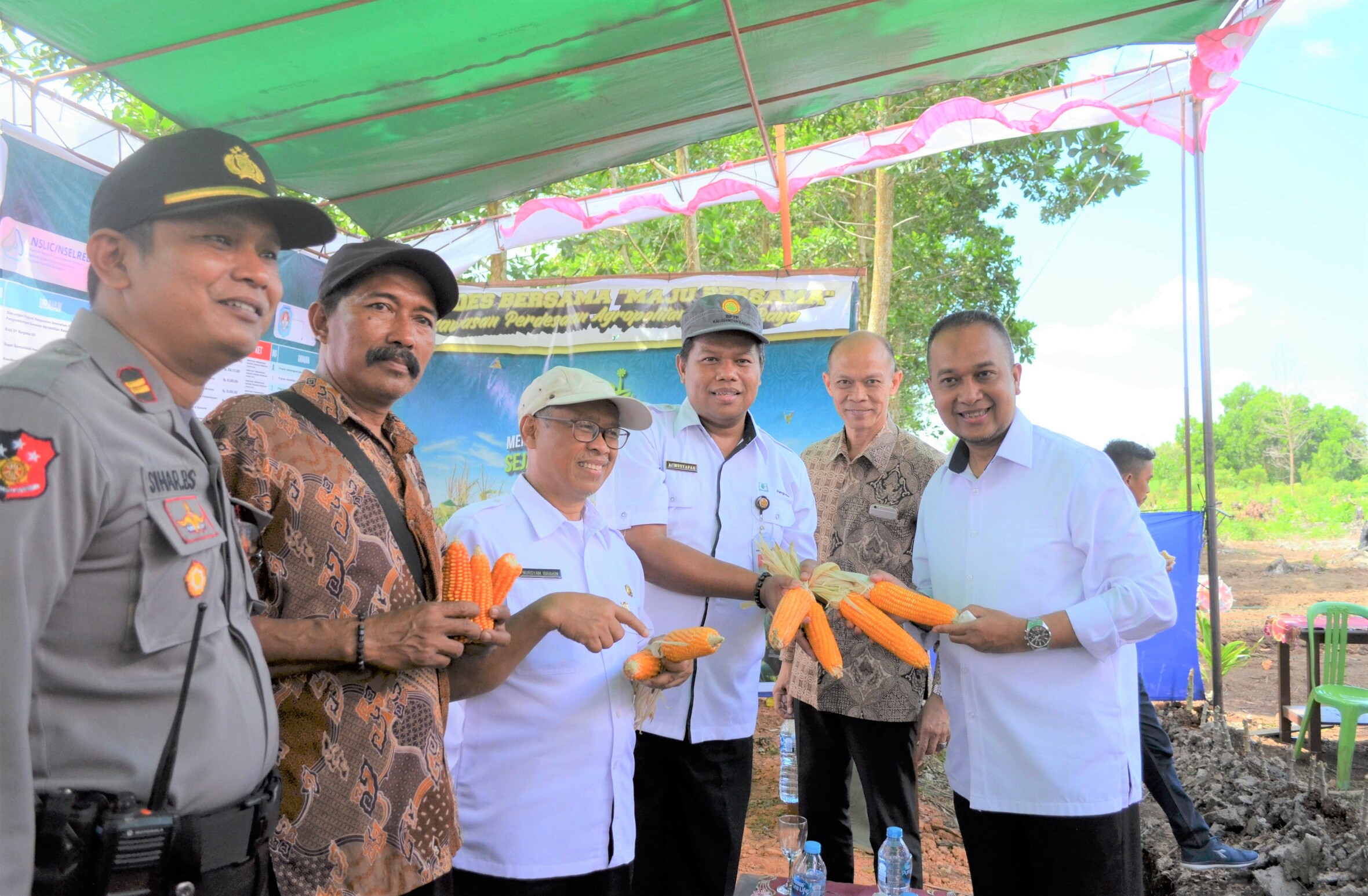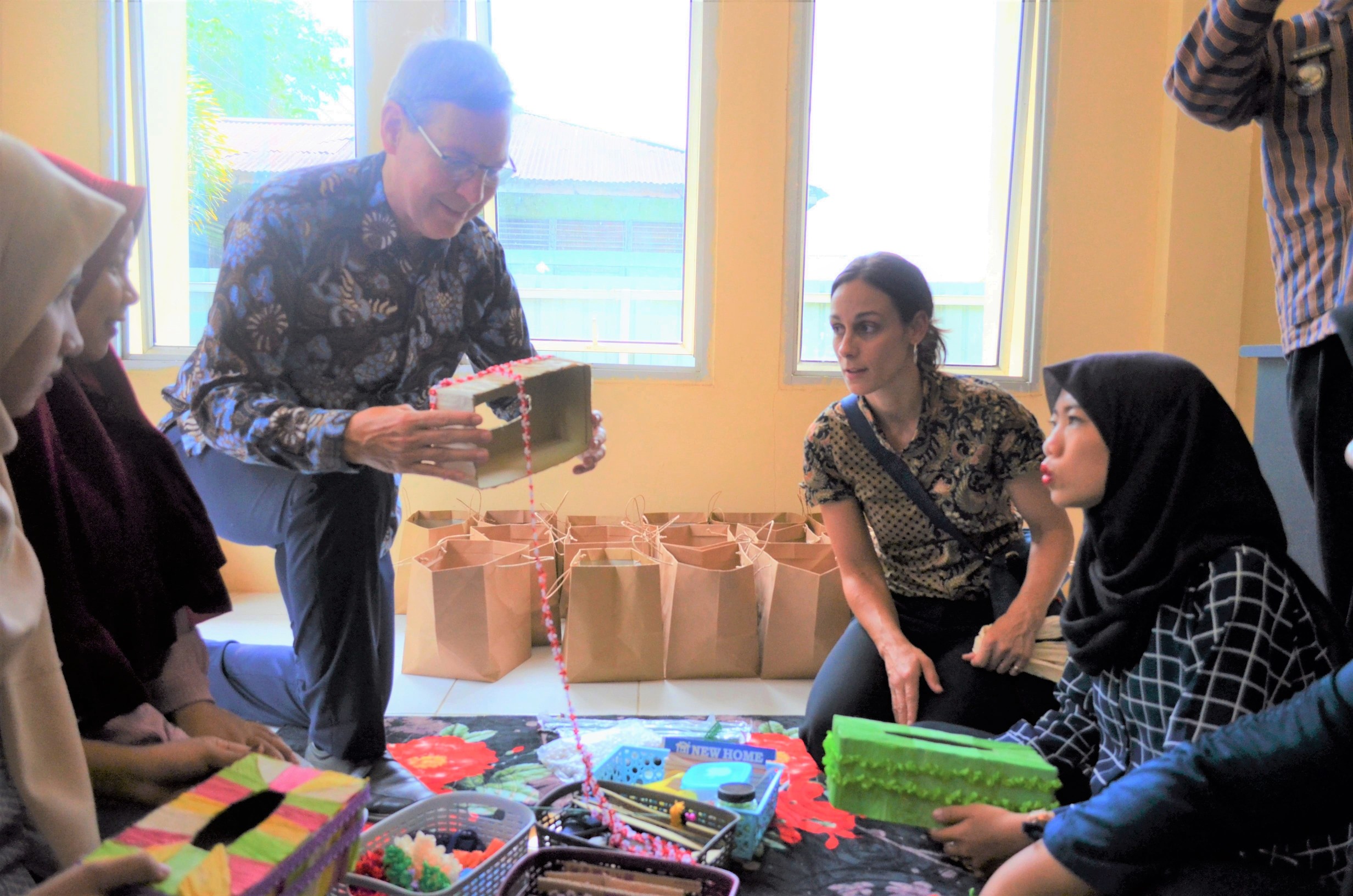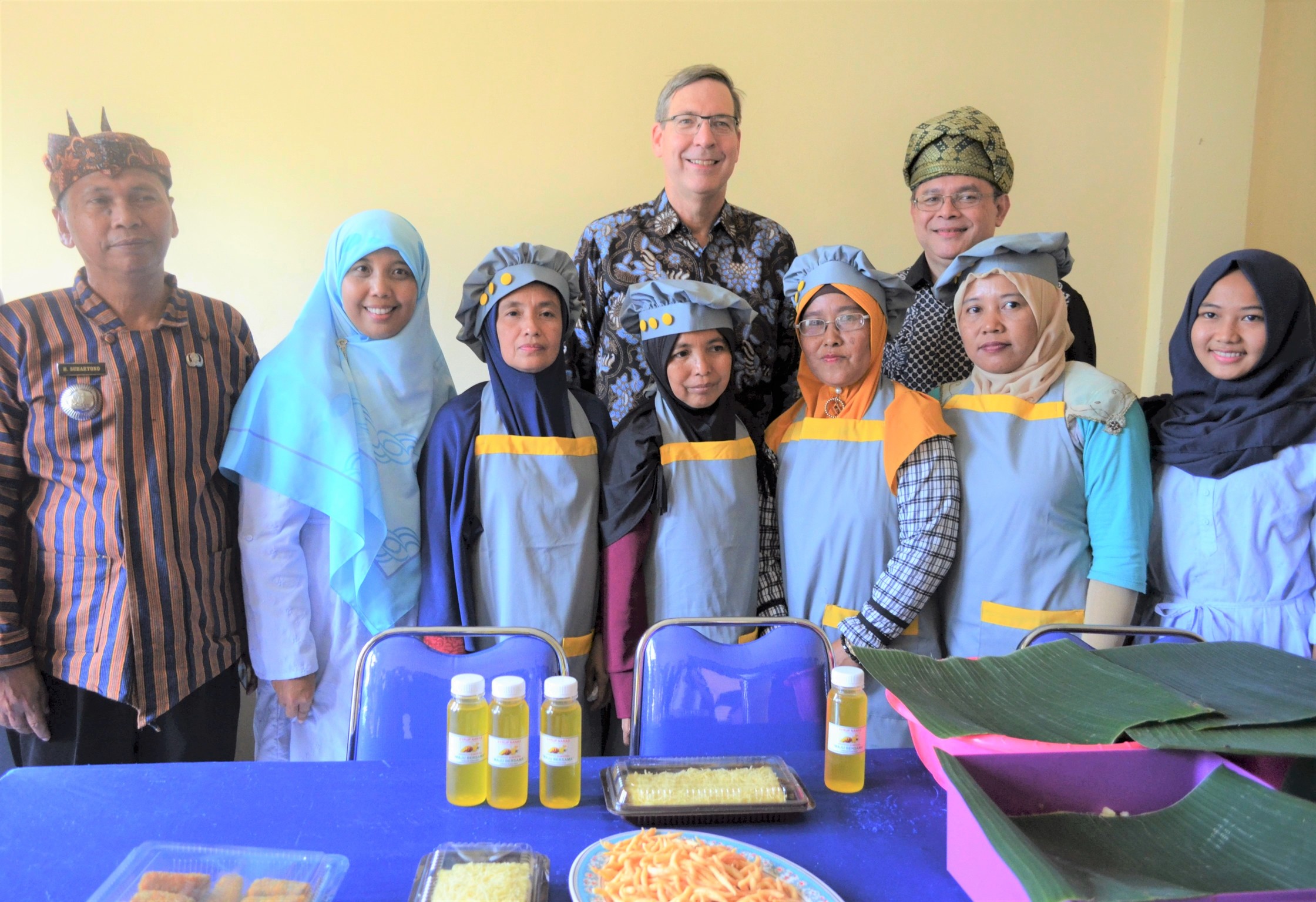KUBU RAYA. The National Support for Local Investment Climates/National Support for Enhancing Local and Regional Economic Development (NSLIC/NSELRED) project, a partnerships between the Government of Indonesia through the Ministry of National Development Planning/Bappenas and the Government of Canada through the Global Affairs Canada (GAC) has successfully encouraged innovation in corn cultivation and its value-added products through integrated farming on peatlands of the Rasau Raya Agropolitan Area in West Kalimantan. The program is implemented through the Responsive Innovation Fund (RIF) scheme from April 2018 to June 2019. To witness the impacts, the Ministry of Bappenas’ Deputy for Regional Development, Rudy Soeprihadi Prawiradinata along with the Canadian Ambassador to Indonesia and Timor-Leste, H.E. Peter MacArthur; GAC’s First Secretary (Development), Anik Fournier; GAC’s Deputy Director for Indonesia and ASEAN Program, Shawna Godbold; CowaterSogema’s Executive Vice-President for Local Governance and Economic Development, Wilson Pearce; NSLIC/NSELRED Project Manager, Ian Steuart; NSLIC/NSELRED Project Director, Dr. Rino A. Sa’danoer and Senior Manager Local and Regional Economic Development, Natalis Padang visited Rasau Raya on July 17, 2019.

The Canadian Ambassador to Indonesia and Timor-Leste, H.E. Peter MacArthur tried a simple corn planter machine designed through RIF-supported training in Rasau Raya Agropolitan Area. The machine significantly helps the work of local corn farmers by cutting the planting process from four working days to one day per hectare. [Photo: ©Virgi Fatmawati/NSLIC/NSELRED]
The national development agenda set out in the National Medium Term Development Plan (RPJMN) emphasizes the importance of tangible and measurable policies and programs to accelerate rural and regional development. Local economic development is regarded as one of the main pillars in accelerating the regional development and it significantly contributes to the national economic performance. In line with these objectives, the national government encourages local governments and stakeholders to carry out innovations for local economic development with the support of appropriate technical assistance. The Deputy Minister for Regional Development at the Ministry of National Development Planning/Bappenas, Rudy Soeprihadi Prawiradinata stated, “Development of rural areas is one of the main targets that support the development of new growth centres to accelerate national development and reduce development disparities between regions. Such initiative can be carried out through the development of local economies based on potential products in each region.”
The Responsive Innovation Fund (RIF) was designed as technical development supports for 18 National Priority Rural Areas (Kawasan Perdesaan Prioritas Nasional or KPPN) through the selection of 60 KPPN areas in the hinterland of 39 Growth Centres for the Improvement of Urban-Rural Linkages as one of the regional development targets stated in the National Medium Term Development Plan (RPJMN) 2015-2019. As a component of NSLIC/NSELRED project managed by CowaterSogema International, RIF provides grants of IDR 18 billion for 18 National Priority Rural Areas. The RIF program is implemented in three phases from 2018 to 2020 by selecting six innovation proposals from six districts each year.
According to NSLIC/NSELRED Project Director, Dr. Rino A. Sa’danoer, the implementation of RIF is expected to be one of the strategic initiatives to support national government in achieving RPJMN 2015-2019 and 2020-2024 targets. “To implement RIF at the local level, NSLIC/NSELRED closely collaborates with the national and local governments, Regional Development Planning Agency (BAPPEDA), the Regional Development Planning, Research and Development Agency, Regionally-Owned Enterprises, MSMEs, etc. RIF aims to create and incubate innovations for local economic development that adhere to the environmentally friendly, gender-responsive and good governance principles. It is also hoped to boost local economic development through innovative approaches such as the development of local products and other economic sectors chosen by the respective local governments.” he added.
1,591 people benefitted from RIF program in Kubu Raya district
The RIF supports for the development of Rasau Raya Agropolitan Area is carried out through four activities: 1) Development of institutional capacity; 2) Innovations in corn-based products and their added value (covering integrated farming by converting peatlands into productive agricultural lands for corn cultivation; development of corn-based food products; improvement in products’ quality and standardization; products licensing and certification; products design and packaging, etc.); 3) Market and networks expansion through BumDesmart ‘Maju Bersama’ (villages-owned business unit of Rasau Raya Agropolitan Area) and through a collaboration with a local agricultural start-up, MyAgro; and 4) Creating fair employment opportunities for both men and women. Implemented from April 2018 to June 2019, the RIF supports for the development of Rasau Raya Agropolitan Area has shown positive impacts. About 1,591 beneficiaries (653 women and 938 men) including local governments, area managers, academics, research institutions, private sectors and community groups (farmer groups, women groups and MSMEs) have received training and other technical assistance.

The Director for Disadvantaged Regions, Transmigration and Rural Development at the Ministry of National Development Planning, Dr. Velix V. Wanggai (far right) and NSLIC/NSELRED Project Director, Dr. Rino A. Sa’danoer (second from right) visited a corn farming plot in Rasau Raya Agropolitan Area. [Photo: ©Virgi Fatmawati/NSLIC/NSELRED]
In terms of the corn development, innovation in managing peatlands into productive plots for corn cultivation has been implemented in partnership with the Tanjungpura University and the Assessment Institute for Agricultural Technology (BPTP) of West Kalimantan. After the peatlands treatment, corn yield increases to 5.6 tons/hectare compared to previously only three tons/hectare. Potential increase in corn production for corn-based food and poultry feed thus reaches 87% with net income is recorded 146% higher from IDR 6.3 million to IDR 15.5 million per hectare. In addition, the establishment of Agricultural Clinic has cut down on the production chain with a cost efficiency of up to 51%. The process of corn seeds planting also becomes shorter and easier, from four working days to just one day per hectare per person using a newly designed corn planter machine.

Ambassador H.E. Peter MacArthur accompanied by GAC’s First Secretary (Development), Anik Fournier learned about the making of corn husk handicrafts from the RIF-supported local young artisans in Kubu Raya district, West Kalimantan. [Photo: ©Virgi Fatmawati/NSLIC/NSELRED]

Ambassador H.E. Peter MacArthur pictured with the Deputy Minister for Regional Development at the Ministry of National Development Planning, Rudy Soeprihadi Prawiradinata (back row, second from right) and the Head of Rasau Raya subdistrict, Suhartono (far left) met the women group of corn-based processing food. [Photo: ©Virgi Fatmawati/NSLIC/NSELRED].
Regent of Kubu Raya, Muda Mahendrawan considered the implementation of RIF has contributed to the district’s economic development. “RIF has significantly supported six villages namely Rasau Jaya Umum, Rasau Jaya 1, Rasau Jaya 2, Rasau Jaya 3, Bintang Mas, Pematang Tujuh and Sungai Bulan. Innovations in managing peatlands, increasing corn productivity and developing various corn-based products have helped local communities in applying new approaches to create added value products and job opportunities that eventually increase their income. We are very proud to see the impacts. RIF serves as a good model in developing rural areas and we plan to replicate it in other villages in Kubu Raya.” said Mahendrawan.
As for the program sustainability, RIF promotes collaborative efforts through revitalizing Agricultural Clinic and creating market demand in partnerships with the BPTP of West Kalimantan, Tanjungpura University, Rasau Vocational School, Bumdesma Maju Bersama and a local startup, MyAgro. Such efforts not only will provide solutions to boost the productivity of Rasau Raya Agropolitan but also align with NSLIC/NSELRED objective to strengthen local and regional economic development for the sustainable development.
Written by Virgi Fatmawati/NSLIC/NSELRED
No Comment
You can post first response comment.